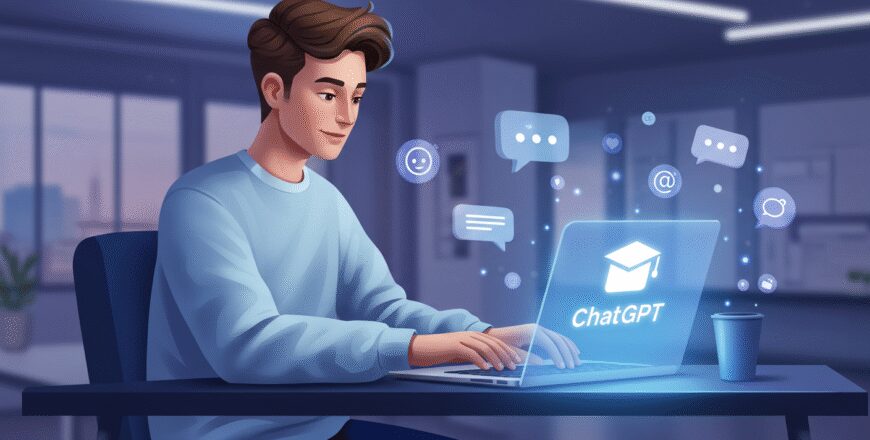ChatGPT: Mastering the Basics for Beginners
- Description
- Curriculum
- FAQ
- Notice
- Reviews
Have you heard about ChatGPT but are not sure how to use it?
This course takes you from a curious beginner to a confident user. Whether you want help writing essays, organizing study notes, or generating new ideas, this course shows you how to use AI clearly, safely, and smartly with no technical background needed.
Course Description
This course is designed for students who want to use ChatGPT to support writing, learning, and productivity. You’ll learn how ChatGPT works, how to write effective prompts, and how to apply it to real-world tasks like studying, summarizing, and planning. Each lecture is short, clear, and designed for immediate use, so you can start seeing results correctly.
What Will You Learn?
-
How to access and use ChatGPT from any device
-
How to write prompts that get helpful, specific answers
-
How to apply ChatGPT to academic tasks like note-taking, studying, and research
-
How to adjust the tone, length, or format of AI responses
-
How to use ChatGPT responsibly and avoid common mistakes
Course Curriculum
Module 1: Getting Started with ChatGPT
Get familiar with what ChatGPT is, what it can do, and how to access it quickly from any device.
-
Lecture 1: What is ChatGPT and Why It Matters
Learn how ChatGPT works, what it’s designed to do, and how it can help students think faster, write better, and learn more efficiently. -
Lecture 2: Accessing ChatGPT and Navigating the Interface
Learn how to open ChatGPT on the web or mobile, where to type your prompts, and how to copy, refresh, or reset chats.
Module 2: Writing Smarter Prompts
Understand how your questions shape your results and how to ask better ones.
-
Lecture 3: What Makes a Prompt Work?
Discover how clarity, tone, and structure affect ChatGPT’s response. Try examples that show vague vs. clear prompts. -
Lecture 4: Adjusting Output – Tone, Format, and Detail
Learn how to control ChatGPT’s tone, make it summarize, or output answers in list/table form.
Module 3: Academic Use Cases for Students
See how ChatGPT can support your writing, studying, and thinking.
-
Lecture 5: Summarizing Articles and Study Notes
Use ChatGPT to extract key ideas from readings and notes—and write summaries that save time. -
Lecture 6: Planning Assignments and Expanding Ideas
Learn to brainstorm, outline essays, and build content from rough ideas using structured prompts. -
Lecture 7: Creating Hooks, Titles, and Talking Points
Generate catchy titles, engaging openings, and short speaking points for presentations or class assignments.
Module 4: Everyday Tasks with ChatGPT
Boost productivity with quick, AI-powered support.
-
Lecture 8: Organizing Schedules and Study Plans
Ask ChatGPT to help plan your week, set reminders, or build study schedules just like a digital assistant. -
Lecture 9: Writing Emails and Messages Professionally
Draft clear and polite emails to professors or teammates—no awkward phrasing or overthinking.
Module 5: Responsible Use and Final Practice
Use AI in a way that helps you grow without replacing your thinking.
-
Lecture 10: Ethical Use + Final Practice Challenge
Learn how to apply ChatGPT ethically in real tasks, write better prompts, and reflect on how to use AI as a support, not a shortcut.
Who This Course Is For?
-
College and university students who are new to ChatGPT
-
Learners who want help with studying, writing, or organizing information
-
Anyone curious about using AI tools for everyday academic and personal tasks
Certificate of Completion
Upon completing the course, students will receive a certificate from Eduta indicating that they can confidently and responsibly utilise ChatGPT for academic and everyday purposes.
We’d love to hear from you!
Your journey through this course is unique—and your feedback can truly make a difference. Whether you found something especially helpful, struggled with a particular section, or simply enjoyed learning something new, your voice matters.
When you share your experience, you're not just helping us improve—you’re helping future students who are standing exactly where you once stood, unsure whether this course is right for them. Your honest words can guide, inspire, and reassure someone who’s eager to learn, just like you were.
So please, take a moment to leave a review. It only takes a minute, but its impact lasts far longer.
Thank you for being a part of this learning community.

-
No experience with AI or ChatGPT required
-
A laptop, tablet, or phone with internet access
-
Willingness to practice using different prompts






